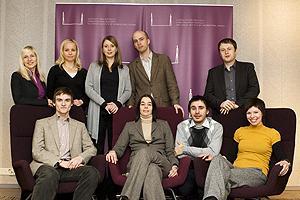
 rctic –
rctic –
The physical environment in the Arctic is changing as a consequence of climate change. Oil and gas exploration, shipping and commercial fisheries are likely to intensify due to the melting of the Arctic Ocean’s sea ice. Our research aims at enhancing our knowledge of the northward geo-economic shift triggered by climate change. The main objects of the research are resource development, (new) regional governance, the reactions of Arctic states thereto, and the implications all of the above for the Arctic environment.
 altic sea protection
altic sea protection![]() is not merely a question of producing scientific knowledge on ecological processes and simply transforming this knowledge into effective policy measures on a rational basis. Instead, designing policies is ultimately a social activity that depends on many conditioning socio-economic, political and cultural factors. Our research aims at increasing our understanding on these societal factors that condition the effective protection of the Baltic Sea. The main research objects are the existing and possible policy instruments of Baltic Sea protection, and decision-making processes at the national, regional and EU-levels.
is not merely a question of producing scientific knowledge on ecological processes and simply transforming this knowledge into effective policy measures on a rational basis. Instead, designing policies is ultimately a social activity that depends on many conditioning socio-economic, political and cultural factors. Our research aims at increasing our understanding on these societal factors that condition the effective protection of the Baltic Sea. The main research objects are the existing and possible policy instruments of Baltic Sea protection, and decision-making processes at the national, regional and EU-levels.
 limate change is the most serious environmental problem of our time. International cooperation aims at launching global policies to mitigate climate change which has already been recognized as a security issue by several actors. Our research analyses the security implications of climate change, national climate and energy policies and the geopolitical implications these have on international relations as well as international negotiations on a post-Kyoto pact especially focusing on the important large emitters including Russia and China. Our goal is to provide knowledge on national debates and their effect on international relations as well as support policy-makers aiming at bringing all the large emitters together under a global climate agreement beyond 2012 in Copenhagen in 2009.
limate change is the most serious environmental problem of our time. International cooperation aims at launching global policies to mitigate climate change which has already been recognized as a security issue by several actors. Our research analyses the security implications of climate change, national climate and energy policies and the geopolitical implications these have on international relations as well as international negotiations on a post-Kyoto pact especially focusing on the important large emitters including Russia and China. Our goal is to provide knowledge on national debates and their effect on international relations as well as support policy-makers aiming at bringing all the large emitters together under a global climate agreement beyond 2012 in Copenhagen in 2009.


